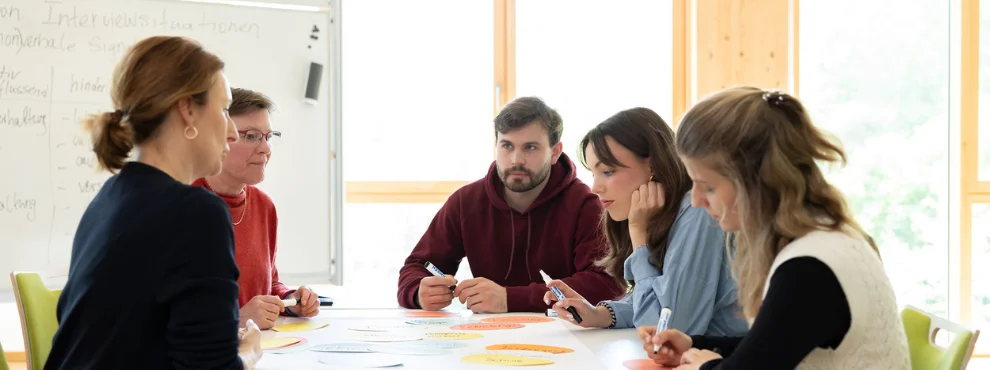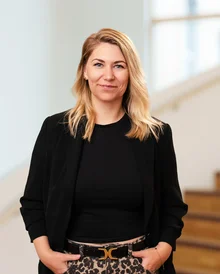25 years of nursing science at Witten/Herdecke University
The UW/H was the first German university to establish a degree programme for professional carers. Since then, it has been sending strong, urgently needed impulses into society, nursing practice and research.

It was pioneering work that led to the founding of the Institute of Nursing Science in 1994 and the new degree programme in the summer semester of 1996. Pioneering work with which the UW/H reacted to serious demographic developments. The challenge, then as now: more and more people are getting older, suffering from chronic illnesses and need qualified care and support. The answer: research as well as training and further education programmes that meet the needs of sick and elderly people as well as people with disabilities - with both areas, science and practice, going hand in hand.
"Good care is much more than washing and changing dressings; it requires experience, knowledge and science," emphasises Prof. Dr Margareta Halek, Head of the School of Nursing Science at the UW/H. People are needed who not only want to help, but are also able to do so - carers who are appropriately qualified, confident and can take on responsibility according to their abilities: This vision was the inspiration for the academisation of nursing 25 years ago.
Since then, the field of nursing science at the UW/H has developed consistently. Today, it is an equal area of the Witten Faculty of Health alongside Medicine, Dentistry and Psychology. Each of the four areas strengthens the faculty and at the same time benefits from its interdisciplinary approach - a unique concept in Germany.
Pioneering work with a strong impact
"The beginnings of nursing science were somewhat bumpy," recalls Margareta Halek. But the decisive factor was that it got started: "The new beginning and the opportunity for carers to develop themselves further - that all released a lot of energy."
Prof Christel Bienstein was the initiator with great charisma. She headed the Institute of Nursing Science from its foundation in 1994 until 2017 and is considered an outstanding personality in nursing and nursing science in Germany.
On 1 September, she was awarded an honorary doctorship for her services to nursing science at the UW/H and in Germany. Margareta Halek experienced her predecessor from the very beginning: the former geriatric nurse was one of the 28 participants in the first semester of the programme in 1996.
Prof Dr Sabine Metzing was also there. At the time, she was a nurse and originally wanted to study for a degree to further her nursing career, but then decided to pursue an academic career. Among other things, she was involved in one of the most socially relevant research projects - a project with which the UW/H brought a previously little-noticed, but actually very important topic area into research: The life situation of children who are exposed to enormous burdens because they are caring for seriously ill relatives.
On an equal footing with doctors
Sabine Metzing was also involved in designing the new Master's degree programme Community Health Nursing (M. Sc.), which will start in the winter semester of 2021/22. It pools the experience and conclusions of recent years in order to meet current and future challenges. These are still great: the Master's degree programme is a response to the fact that fewer and fewer doctors are settling in rural regions. Added to this are the challenges in the healthcare system: demographic change, an increase in complex chronic diseases and the rising number of people with long-term care needs.
"The aim is for nurses with additional qualifications to be able to support people with chronic illnesses and disabilities and provide medical services that are currently still the responsibility of doctors," explains Sabine Metzing. Ideally, specialists should therefore be equipped with a high level of decision-making authority: "We need carers who can act on an equal footing with doctors," the scientist summarises.
But the reality is still different. "In Germany, there is a lack of structures and acceptance for highly qualified carers: in rural regions as well as in clinics and retirement homes," says Margareta Halek. The UW/H Head of Nursing Science sees a shortage of skilled labour as one of the central problems, as well as a lack of appreciation and a low salary level: "These are all problems of a predominantly female profession."
Unique in Germany
The 25th anniversary of nursing science at Witten/Herdecke University has these two sides to it: On the one hand, looking back on the achievements of the past years shows how much has been done and what impetus has been given to society, research and nursing practice. On the other hand, it also shows how much room for improvement there still is: on the way to a professional image that does justice to the reality of nursing as well as the potential and achievements of carers.
The UW/H remains true to its vision and at the same time continues to develop: by researching the complex subject area and qualifying carers for demanding activities. The Master's degree programme in Community Health Nursing is another milestone on this path: an approach with which other countries are already gaining good experience - this offer is a real speciality for Germany.
Contact person

Svenja Malessa
Press Officer
Administration | Communication & Marketing
Alfred-Herrhausen-Straße 48
58455 Witten
Room number: 2.F05